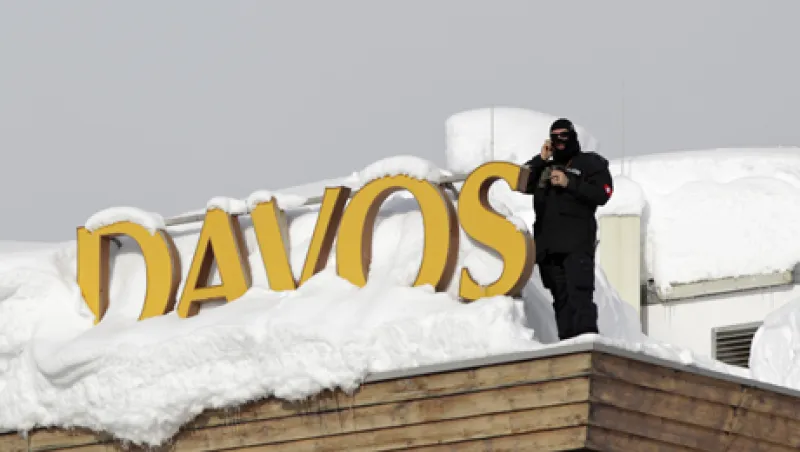As global financiers, industry chieftains, and politicians descend on Davos, Switzerland, for the annual World Economic Forum, there are clear signs of a shift in the trans-Atlantic balance of power.
American bankers are set to make their biggest splash at the Alpine jamboree since the failure of Lehman Brothers Holdings triggered a near systemic collapse in 2008. Citigroup CEO Vikram Pandit, who kept a low profile in previous years when the U.S. Treasury was keeping his bank afloat, will serve as one of the forum’s six co-chairmen, a high-profile role that signals his return to the global elite. Brian Moynihan will lead a big team of senior executives from Bank of America Merrill Lynch. Also attending is Jamie Dimon, who boasted last week that JPMorgan Chase & Co. was taking market share from troubled European banks. And Morgan Stanley chairman and CEO James Gorman will make his Davos debut.
In contrast to the previous two years, when U.S. bank executives spent much of their Davos time huddled with politicians and regulators in an effort to soften the blow of tighter regulation, this year they will be focusing their energies on the traditional pastime of cutting deals on the sidelines of the forum’s gabfest. The atmosphere is far from ebullient, considering the economic uncertainty and profit pressures that Wall Street faces, but it marks a welcome return to business first.
The Europeans, by contrast, are grabbing the attention for all the wrong reasons. They have come to Davos in full crisis mode, with politicians seeking to reassure business executives that they have the region’s debt crisis under control and bankers putting a brave face on their forced deleveraging and global retreat.
The scale of that pullback was underscored Tuesday by fresh projections from the Institute of International Finance (IIF), an association of most of the world’s largest banks and insurers. The group forecasts that private capital flows to emerging-markets countries would drop by 18 percent this year, to $746 billion, mostly because of retrenchment by European financial institutions. Commercial banks will extend about $38 billion in credit to emerging markets this year, down from a forecast of $215 billion as recently as September.
The strains of Europe’s debt crisis “are extending their tentacles to virtually every corner of the globe,” IIF managing director Charles Dallara said at a news conference in Zurich on his way to Davos. Institute economists blame the European Banking Authority for exacerbating the problem. In a bid to restore confidence, the authority has toughened and accelerated new capital requirements, mandating that banks boost capital ratios to 9 percent by the end of 2013. The move has sparked a furious effort by banks to sell off assets and raise capital.
Dallara also delivered a pre-Davos warning about Greece’s debt restructuring after European Union finance ministers on Monday rejected as inadequate a 50 percent write-down of the country’s private sector obligations, which the IIF had endorsed. That 50 percent offer was “fully consistent” with an outline agreement that banks struck with EU leaders in October, he noted. Since then, however, the debt crisis has taken a further turn for the worse. Most private economists believe Greece needs even greater forgiveness to reduce its debt to a sustainable level, and EU politicians have decided to play hard ball. With an effective deadline looming around the end of the month to avert a Greek default in March, Dallara and senior bankers will have plenty of urgent conversations with EU officials attending the forum.
European officials will hog the forum’s keynote events. Chancellor Angela Merkel of Germany, the ultimate power broker in the debt crisis, can expect a full house when she delivers the opening address at Wednesday’s plenary session. Bankers will be hoping she signals a clearer endorsement for a bigger European rescue package, which German officials hinted at in Brussels on Monday. And Mario Draghi, the European Central Bank president whose generous liquidity has buoyed EU banks and markets in recent weeks, will offer his prescription for restoring economic growth and confidence on Friday.
The outlook may be uncertain, but Davos man refuses to be held hostage by fear. The forum agenda includes a host of social activists, academics, and Nobel prize winners, including such luminaries as economist Michael Spence and microfinance pioneer Muhammad Yunus, offering what are billed as breakthrough ideas on everything from trade policy to combating unemployment to suggesting how Asian wisdom can complement Western thinking. And attendees who survive the week can look forward to some Latin revelry courtesy of Brazil’s Ministry of Industry and Trade, which is sponsoring the soiree that wraps up the forum on Saturday night.






